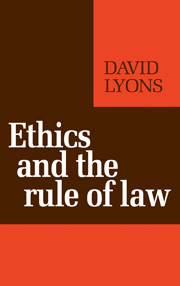5 - Legal coercion and moral principle
Published online by Cambridge University Press: 19 January 2010
Summary
Even if law is not by its nature coercive, legal systems typically use threats and force to insure compliance with their norms. Our question is how such practices can be justified.
Two general assumptions provide a framework for this discussion: law is morally fallible, and moral judgments are capable of being sound. If law is morally fallible, we cannot assume that legal uses of coercion are justifiable. It is generally agreed that the use of force and coercion normally needs justification. If that is true, it is appropriate to ask for a defense of legal coercion. It may be noted that the idea that coercion requires justification itself assumes that moral judgments are capable of being sound. Otherwise, there could be no sound moral objection to coercion.
Coercion deprives us of the freedom to choose by our own best lights. Its legal use deprives people of other goods as well, such as possessions and even life. No wonder it seems to require justification. But how can such practices be defended?
This question is usually conceived of as the problem of justifying legal punishment. But it is somewhat broader than that may suggest. For the legal use of coercion is not limited to punishments imposed under the criminal law, since it stands behind all legal arrangements that are enforced, including “civil remedies” in other branches of law, such as the law of property, torts, and contracts. The criminal law provides penalties for acts that are officially classified as offenses, and officials are mandated to enforce its rules.
- Type
- Chapter
- Information
- Ethics and the Rule of Law , pp. 145 - 169Publisher: Cambridge University PressPrint publication year: 1983
- 1
- Cited by



